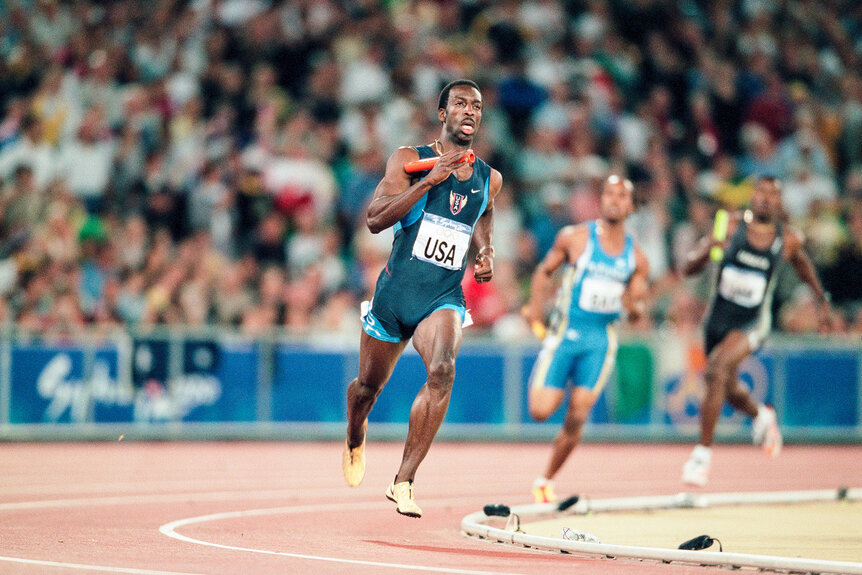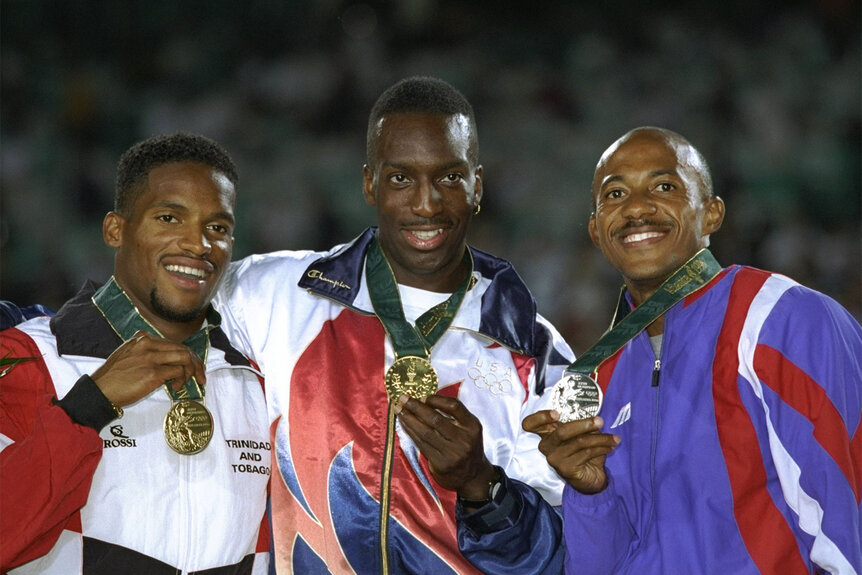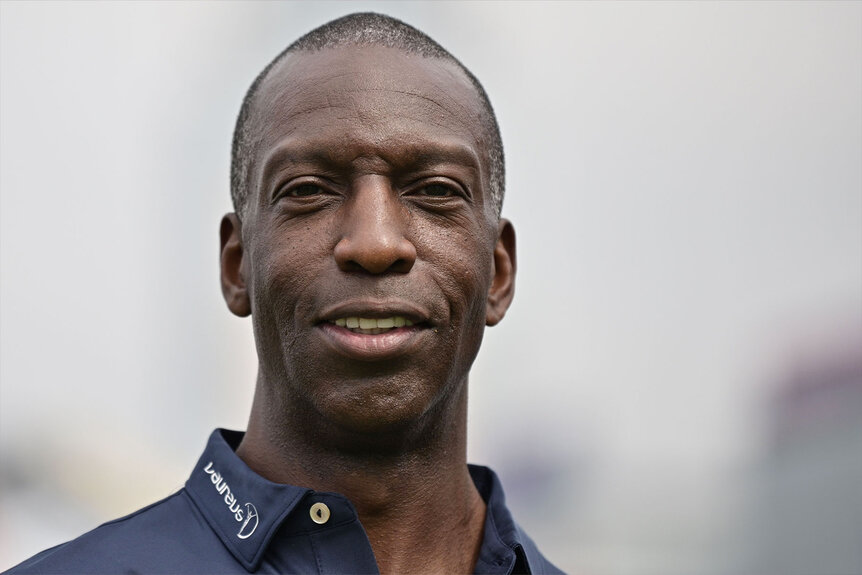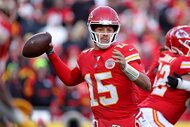Sprinter Michael Johnson Continues to Inspire Others After Making Olympic History
After rewriting the book on Team USA’s success in track and field, “The Duck” is helping to pave the way for future athletes.
It’s impossible to overlook the contributions of Team USA's legendary sprinter Michael Johnson.
After first owning the nickname of “The Duck” because of his unusual gait, Johnson skyrocketed to fame through his incomparable journey of 58 undefeated races in the 400m event that began in 1993. During that span, while food poisoning resulted in a lackluster showing in his first Olympic outing at the Barcelona Games — a performance that he still calls his greatest disappointment — The Duck migrated south for the 1996 Games in Atlanta, Georgia with one singular goal in mind: prove to the world he was the best.
"What this means is history," Johnson said at the time, per ESPN. "There are two household names in the history of track and field — Jesse Owens and Carl Lewis. I'm in position to be the third. It'll be the biggest show of the Olympics. I'm going to be The Man at these Olympics."
That wasn’t bragging; that was just the truth. There, in front of 83,000 boisterous patriots, while sporting his memorable golden-booted spikes that still leave a jealous twinkle in the eyes of Hermes, Johnson dusted the competition and set records in the 200m and 400m races — a crowning achievement that had never before or since been completed, and only after 12 years did Usain Bolt break his reigning time of 19.32 seconds in the 200m. Deservingly so, the birdman was now “Superman.”
For more on the Olympics:
Gymnast Fred Richard Is Going to the 2024 Olympics After Historic Win: "It's Amazing"
The Olympic Medals in Paris Will Literally Contain a Piece of the Eiffel Tower
How Paralympian Oksana Masters Found Purpose Through Hardship: "Don't Be Afraid"
As a four-time gold medalist, who harnessed an on-track fierceness second to potentially only one other Team USA titan, Carl Lewis, Johnson didn’t just etch his name in the history books, the emboldened warrior took a jackhammer to them, creating shockwaves that still reverberate today. But with Father Time catching up to even the lightning of the Lone Star state, the native of Dallas, Texas is doing his part to pass the torch and then some.
Baylor University
Long before Michael Johnson proudly sported the Stars and Stripes for Team USA, winning four gold medals in three different events across three different Olympiads — the 1992 Games in Barcelona, Spain, the 1996 Games in Atlanta, Georgia, and the 2000 Games in Sydney, Australia — Johnson, the youngest of five siblings, was making proud Texans even prouder, winning five NCAA championships for the Christian collegiate institution, Baylor University. After scoring three titles in the 200m race and two titles in the 4x400m event, Johnson’s accolades helped elevate his alma mater’s reputation to be known as “Quarter Mile U,” according to Baylor’s website.
Since hanging up his fabled golden sprinter shoes, Johnson, who graduated with a degree in business, has periodically utilized his vast expertise as an assistant coach for Baylor’s Track and Field team while also serving as the host of the eponymously named annual Michael Johnson Invitational.
Television and Media Appearances
Considering the accolades he garnered throughout his career — four Olympic gold medals, eight World Championship titles and three Grand Prix Final titles — the charismatic Michael Johnson and his unrivaled expertise in sprinting equates to someone you need to have in the booth, and he has been active as a commentator for BBC since his retirement, following the culmination of the Sydney Games in 2000. Lending his unique blend of insight and acumen, Johnson has been a pillar for Olympic commentating community, even earning the BBC’s coveted Sports Personality of the Year Award. He parlayed his success as an athlete and a commentator into making appearances on multiple docuseries and reality television programs, including, among others, the ninth season NBC’s The Celebrity Apprentice, according to IMDB.
As a role model, whose core values of honesty and integrity have been fundamental to his motivational speaking engagements and his authorship of numerous books, in traditional American parlance, there are few former athletes that have ever measured up to Johnson as the go-to guru for both advice and expertise.
What is Michael Johnson doing now?
Michael Johnson opened Michael Johnson Performance in 2007 in Dallas, Texas with the aim of offering athletes and coaches the elite training tools and programs they required to stay ahead of the competition while also cultivating the intangible qualities that make someone an effective leader through their own ambitions in sport. Sports medicine and physical therapy for injured athletes rounded out the services offered by the institution.
“We’re focused on helping athletes be the best they can,” Johnson said in an Olympics promotional video. “My foundation is really focused on helping find young people around the world who are really interested in helping their communities and helping other young people who have overcome significant challenges just as they have.”
Though the training facility closed its doors in 2022, opting for a digital curriculum instead, Johnson recently partnered with OMORPHO, a cutting-edge fitness and training sportswear company that redirects small amounts of naturally distributed weight in its garments to help individuals train harder and become stronger. According to the company’s website, the partnership with Johnson “aims to enhance training methodologies for elite athletes by incorporating OMORPHO’s Gravity Sportswear into their preparation to improve performance and help break future records.”
Michael Johnson's Illness
In 2018 at just 50 years of age, Michael Johnson suffered a stroke in the right portion of the brain known as the thalmus that left the legendary speedster and four-time Olympic gold medalist equally dejected as he was debilitated, according to The Guardian. Forget running — now critically impaired, Johnson was barely able to put one foot in front of the other and walk the short distance to his kitchen in his Malibu residence.
“It made me feel — it’s hard to describe — just afraid and scared, and wondering what my future was going to be,” Johnson conveyed to The Guardian in 2019.
But Johnson, who’s known for tenacity and impeccable approach to training, didn’t wallow in his own anger or retract into the constant waves of self-pity. After all, he was fit, ate well, and took care of himself — why did this happen to him? Instead, he did the only thing he knew how to do: fight.
“I think about looking at myself in the mirror, struggling to hold a balance position for more than 10 seconds or struggling to coordinate my body when I used to be one of the best athletes in the world,” he added. “But what that did for me is encourage me to channel that in the right way, [and believe] that if anyone can do this, I can.”
Just as he had manifested his heroic victories at the 1996 Atlanta Games, in just eight months after enduring such a life-altering medical emergency, Johnson’s approach to his recovery paid off, and he was, as he said in his own words, “100% recovered.”
While he’s not racing his way into any record books these days, Johnson’s new lease on life is reinforcing his indomitable spirit, leading him to branch off in a new mission to help others who have suffered life he has. He’s now using his harrowing experience for good, helping to bolster the Stroke Association’s Rebuilding Live campaign, which utilizes stories from stroke survivors to educate people on the monumental impact random strokes can have on those who suffer them. FAST, the acronym behind the campaign, stands for all of the warning signs to look for in assessing strokes — face drooping, arm weakness and speech difficulty — and what to do when any of those presents itself.
"Being a stroke survivor is now part of who I am," Johnson revealed to the American Heart Association. "I want people to understand it can happen to anyone and that there are ways to minimize their risk."
Be sure to tune in to the 2024 Olympics in Paris, streaming on Peacock and NBC this July.



















